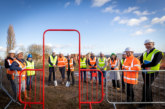In designing a new boiler specifically for social housing, Potterton invited 50 housing providers to be a part of the development process, including L&Q. LABM has all the details.
There are approximately 1,700 registered social housing providers in the UK operating more than four million properties between them. Whilst their portfolios may differ in many ways, they are all united by a common goal: to keep tenants safe and warm in their homes whilst dealing with ever-tightening budgets. LABM reports
Modern gas boilers, when installed and maintained to manufacturers’ instructions, enjoy a long operating life and represent excellent value for money for both tenant and landlord. However, a familiar frustration for any asset or property manager is that there are tenants who are reluctant to grant engineers access to conduct essential maintenance. This can lead to boilers being overdue a service and safety check for many months; potentially putting the tenant at risk of CO poisoning if the unit has been tampered with or damaged. Landlords can also be subject to hefty penalties for non-compliance with Gas Safety Regulations.

L&Q Group, which owns or manages over 90,000 homes in London and the South-east, was no different. Gas Service Manager, Steve Chambers explains: “Simplicity is one of the main challenges we had in relation to finding suitable boilers for our housing stock. We needed an appliance which was easy to use, as we have quite a broad mix of residents and don’t want them messing around with their system.
“We did fit service timers as part of the control system to try and tackle the issue of gaining access, but ultimately we wanted a boiler which had this facility built-in and was easy for the engineer to set. Another consideration was the build quality of the appliance. We were looking for something, which felt sturdy, reliable and had good quality components. Just because the boiler is for social housing, it doesn’t mean that it should be an inferior product.”
Developing a product
L&Q Group was one of 50 different social housing partners invited to be part of the development process for Potterton’s new boiler for social housing. They were joined by a large number of contractors from around the UK, to ensure the product would not only meet the needs of social housing but also the engineers who would be installing and maintaining them.
The results from focus groups were collated and classified into varying levels of importance to determine which features were essential, nice-to-have or unnecessary, using robust modelling techniques.
Steve continues: “The fact that our wants and wishes were taken into consideration was really refreshing. It also helped that everybody was brought together — contractors and other landlords — as it generated some healthy debate about what was good, or not so good. We then drilled down and focussed on smaller groups of just individuals’ end clients with their own contractor partners to look closer at their unique requirements.
“After the initial feedback, we were shown prototypes which we were also asked to comment on, so we were able to see the boiler in its various stages. That was quite useful, and to my knowledge no other manufacturer had done anything like that before.”

The end results
This collective process led to the development of Potterton Assure, the UK’s first boiler designed in partnership with social housing providers. With extra focus given to simplifying the installation process, the Assure range has a light lift weight between 19.5 – 29kg and is compact enough to fit into a standard kitchen cupboard. It also benefits from an optimised pipe layout, ensuring the boilers can be hung quickly in place and the combi and system comes with a full void at the rear, allowing pipes to be easily run up the back of the appliance with no change to the overall boiler’s dimensions or the costly requirement to purchase a stand-off kit. Straightforward access to all components is assured, for ease of service and maintenance.
There are also extra features available as optional upgrades, including the Potterton Safety Assist, which enables the installer to fix the correct levels of heating and hot water comfort for vulnerable tenants, which cannot then be altered by mistake.
From prototype to properties
L&Q is fitting the boilers as part of its maintenance programme. Steve explains: “We have 45,000 individual gas properties in our portfolio. Assuming the lifecycle of a boiler is 15 years, this equates to 3,000 new boilers each year to keep pace with age and keep your stock up to date. This year we are averaging 3,300 boilers, however, we expect this number to rise following our recent merger with East Thames housing which has resulted in us acquiring 6000-plus homes.”
L&Q works with several contractor partners, including Smith & Byford and K&T Heating, both of which were involved in the initial development.
Mark Akers, Operational Installation Manager at K&T Heating, comments: “I’m from an installation background, so during the Assure development process I prioritised features which would make this process much quicker and easier for the team. For example, its compact size and lightweight makes it easier to lift and place in small spaces, whilst the pipes behind facility enables a tidy installation in a kitchen cupboard.
“We’re now fitting between 40-50 Assure boilers per month on average, depending on the client’s schedule. Although, L&Q have always had good investment levels in their stock, so this number is usually quite consistent.”
Sandy Meechan, Field Installs Manager at Smith and Byford, adds: “As a close partner of Potterton I was invited to give feedback on key features of the boiler and make recommendations on the design. One of the features I specified was a space frame — usually we would have to pay extra for this so it’s a nice bonus to have it included with the boiler.
“It made a nice change to be asked for my input at the design stage and my clients appreciated being brought along to see the whole product development process. We currently fit on average 50 boilers a month and have received great feedback. The engineers are particularly pleased that the boiler is lightweight, compact and reasonably easy to fit.”
Future proofing
Changes to technical guidance under Building Regulations (known as Boiler Plus) state that after 6th of April 2018, all new combi boilers must be installed with one of four additional measures: flue gas heat recovery (FGHR); load compensation; weather compensation; or smart controls with automation and optimisation. Having to install additional devices presents a challenge to the social housing sector, as budgets are already tight. However, social housing providers have the option of choosing IFOS, Potterton Commercial’s patented in-flue outdoor sensor, as a cost-effective solution.
“It’s a real winner,” says Steve, “it’s another reason to continue fitting Assure because we know that it’s going to make it easy to comply with Boiler Plus. Ultimately, you’ve got a boiler that’s reliable and excellent quality with all the features we need, and you’ve got something that’s future-proofing it as well that nobody else is currently doing. The whole process was very enjoyable, and everybody is really pleased with the end result.”









